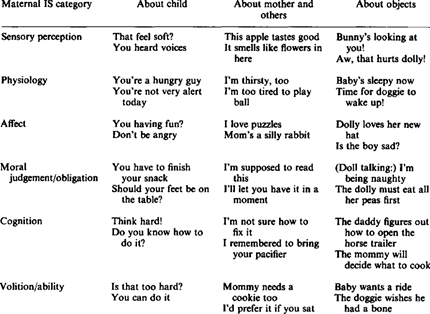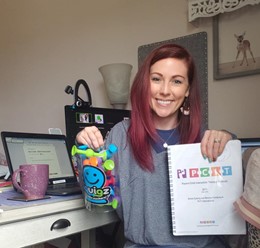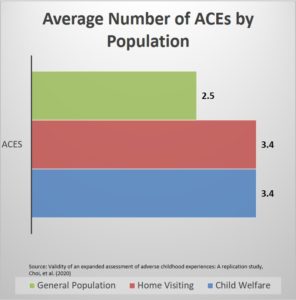The mission of the Institute for Child and Family Well-Being is to improve the lives of children and families with complex challenges by implementing effective programs, conducting cutting-edge research, engaging communities, and promoting systems change.
The Institute for Child and Family Well-Being is a collaboration between Children’s Wisconsin and the Helen Bader School of Social Welfare at the University of Wisconsin-Milwaukee. The shared values and strengths of this academic-community partnership are reflected in the Institute’s three core service areas: Program Design and Implementation, Research and Evaluation, and Community Engagement and Systems Change.
In This Issue
- Meet the ICFW – Child and Family Therapist Meghan Christian and Policy and Practice Analyst Colleen Janczewski
- Program Design & Implementation
- Research and Evaluation
- Community Engagement and Systems Change
- Recent and Upcoming Events
Meet the ICFW

Meghan Christian is a Child and Family Therapist with the Institute for Child and Family Well-Being and a Licensed Clinical Social Worker.
Meghan has spent most of her career in the nonprofit sector, working with people who have experienced acute or ongoing trauma including abused children and adults, refugees and families living in poverty. Meghan’s interests lie in translating research on the effects of trauma on the developing brain into practical ways of using evidence-based interventions with her clients. She’s particularly interested in the role resilience plays in protecting against and transforming negative neurophysiological changes.
Along with her direct practice, Meghan enjoys exchanging perspectives and knowledge with fellow helping professionals by way of communities of practice, case consultation and facilitating workshops relating to neurodevelopment, responsive relationships and resilience.
Meghan received her master’s degree in social work in 2009 from the University of Wisconsin-Milwaukee. She earned her bachelor’s degree in social work from the same institution in 2006.

Dr. Colleen Janczewski is a policy and practice analyst at ICFW and an assistant professor at the University of Wisconsin-Milwaukee’s Helen Bader School of Social Welfare. Her research interests include child maltreatment and improving public systems that serve children and families. She has expertise in applying advanced statistical techniques to inform policy decisions and practice innovations in social service systems.
In terms of ICFW projects, Dr. Janczewski is currently the lead evaluator of the Alternative Response in Wisconsin evaluation, for the Wisconsin Department of Children and Families. She is also on the evaluation team for the FACT Study, the Healthy Families Study, Family Foundations Home Visiting Program, and the Trauma and Recovery Project. Dr. Janczewski holds a Ph.D. in social welfare from the University of Wisconsin-Milwaukee and a master’s degree in social work from Virginia Commonwealth University.
Program Design & Implementation
The Institute develops, implements and disseminates validated prevention and intervention strategies that are accessible in real-world settings.
Innovation and Executive Functioning: A new feasibility study
By Gabriel McGaughey and Paige Bintz
Executive function (EF) skills are like an air traffic control system in the brain that helps us manage information, set and work towards goals, and make decisions that help us reach those goals. EF Skills, which can be developed throughout the life-course, are central to navigating distractions, unexpected challenges, and stressful situations while making decisions that contribute to long-term goal attainment.

Childhood experiences are the foundation for healthy development into adulthood. Adverse Childhood Experiences (ACEs) can cause cracks in that foundation, potentially impairing EF Skills and contributing to less intentional self-regulation. ICFW team members Drs. Mersky and Janczewski co-authored a study finding that parents in home visiting programs reported the same level of ACEs as parents with children involved in the child welfare system.
Resilience, or the ability to overcome serious hardship, is a central concept operationalized, in part, through EF Skills. Building resilience helps children and adults navigate stressful situations and the lingering impact of trauma.
Parents participating in Children’s Wisconsin Wausau home visiting program face a myriad of complex challenges beyond the legacy of ACEs. 77% of caregivers in that program have reported an alcohol or other drug abuse, mental health, or domestic violence issue. 48% of caregivers screened positive for postnatal depression. Through those challenges, 56% of parents are receiving services and 90% demonstrate positive parent-child interactions, a core component to child health, well-being, and resilience.
How might programs that already reach families further address enhancing executive functioning of parents and children in their programs to promote long-term stability and success?
Children’s Wisconsin, along with two other Children’s Home Society of America partner organizations, is participating in a collaborative feasibility study of the “Executive Functioning Across Generations™” program, funded by Frontiers of Innovations, the R&D platform of the Center on the Developing Child at Harvard University. Developed in 2017 by The Family Partnership (TFP) in Minneapolis, Minnesota, the organizations are working together to adapt the intervention for virtual use in a Healthy Families America home visiting program.

Over the course of 10 virtual sessions, parents learn about brain science and familiarize themselves with the types of activities that help foster brain development and self-regulation in their children through a language-based curriculum. Specifically, there will be an increase in knowledge of brain science, internal state words, theory of mind, serve and return, and personal narratives (BITSN’s). These are all key functions of brain development in children. Parents will learn how to recognize, model and respond to Internal State Words (ISWs) as part of a supportive relationship with their child. ISWs are important because they are used by children in order to express themselves by describing thoughts, feelings and perceptions. This helps them to tell stories about events that have affected them emotionally (see chart).
Home visitors coach families, encourage further learning, and provide teaching tools, like storybooks that use ISW-based language. There will also be activities and handouts for the parents to practice skills with their children in between the sessions. This project has a greater impact with the implementation of a two-generation approach because it allows for more alignment with the goals and more stability in the family unit. The skills learned and the impacts made can continue to affect more generations and create a “domino effect” of positive development.
In order to measure the impact of the curriculum, Minnesota Executive Functioning Scale (MEFS), developed at the University of Minnesota by Dr. Stephanie M. Carlson and Dr. Philip Zelazo, will be used. The app is a quick, “game-like” measure of executive functioning for anyone over the age of 2 that features audio and picture-based prompts. This administration should only take 15 minutes to complete virtually. Overall, the MEFS provides a direct behavioral measure of executive functioning skills which are vital for the development of a child’s social and emotional wellbeing.
By increasing the use of internal state words and a personal narrative, Executive Functioning Across Generations™ helps to foster better parent/child relationships, which is central to child resiliency and being able to adapt to challenges. The ICFW is looking forward to collaborating with The Family Partnership, Nebraska Children’s Home Society, Children and Families First of Delaware, and the Frontiers of Innovation at the Center on the Developing Child at Harvard University to share our lessons learned as we go through this process.
Learn More:
Frontiers of Innovation: An R&D platform designed to accelerate the development and adoption of science-based innovations that achieve breakthrough impact at scale.
Executive Functioning Across Generations
Leveraging A Two-Generation Approach To Improve Executive Function in Families
Research and Evaluation
The Institute accelerates the process of translating knowledge into direct practices, programs and policies that promote health and well-being, and provides analytic, data management and grant-writing support.
Promoting Dignity through Work
By Josh Mersky and Dimitri Topitzes
We are pleased to announce a new partnership with Goodwill Industries of Southeast Wisconsin on their Boys and Men of Color Initiative, which aims to support career advancement, self-sufficiency, and leadership development among youth and young men in Milwaukee. An Institute team headed by James “Dimitri” Topitzes, Josh Mersky, and Allison Amphlett are working with Goodwill to design and evaluate an innovative workforce development program to address barriers to economic prosperity, including generational poverty and trauma, incarceration, and health disparities. The program’s immediate goal is to help participants establish a foothold in the labor force. In the long run, the program aims to help young men of color forge a path toward career success and community leadership.
The Boys and Men of Color Initiative builds on the Institute’s ongoing commitment to workforce development efforts that promote the dignity of work. We continue to collaborate with the Public Policy Institute at Community Advocates on the Healthy Workers, Healthy Wisconsin project. This job enhancement project aims to strengthen employment services for low-income job seekers by increasing client access to trauma-responsive health and mental health care. The Institute also is partnering with Higher Expectations for Racine County on its Rise Up initiative, which is supporting underemployed mothers with young children by increasing access to an enhanced workforce training program. Taken together, these workforce development projects draw on the Institute’s academic expertise and reflects our mission to improve the lives of children and families with complex challenges by implementing effective programs, conducting cutting-edge research, engaging communities, and promoting systems change.
Recent ICFW Publications
Choi, C., Mersky, J. P., Janczewski, C. E., Plummer Lee, C., Davies, W. H., & Lang, A. C. (in press). The Childhood Experiences Survey: Replication study of an expanded assessment of adverse childhood experiences. Children and Youth Services Review.
Mersky, J. P., Janczewski, C. E., & Plummer Lee, C., Gilbert, R. M., McAtee, C., & Yasin, T. (in press). Effects of home visiting on breastfeeding and bedsharing in a low-income urban sample. Journal of Health Education and Behavior.
Plummer Lee, C., Mersky, J. P., Marsee, I., & Fuemmeler, B. (in press). Child maltreatment and marijuana use trajectories. Development and Psychopathology.
Zhang, L., & Mersky, J. P. Bidirectional relations between adverse childhood experiences and children’s behavioral problems. (in press). Child and Adolescent Social Work Journal.
Zhang, L., Mersky, J. P., & Topitzes, J. (in press). Adverse childhood experiences and psychological well-being in a rural sample of Chinese young adults. Child Abuse & Neglect.
Community Engagement & Systems Change
The Institute develops community-university partnerships to promote systems change that increases the accessibility of evidence-based and evidence-informed practices.
Trauma and Recovery Project (TARP) 2020: Implications of COVID-19 on Training, Service Delivery, and Trauma Screening
By Leah Cerwin
Virtual Training

As the ICFW set out to adapt to the unprecedented changes brought about by COVID-19, many services provided by the Trauma and Recovery Project moved to virtual delivery. This year, our trainers were abruptly asked to shift all training of evidence-based interventions to a virtual setting. This necessitated hand delivery of printed materials to trainees’ homes, the need to learn and use novel tools and apps to complete activities virtually, and changes to training structure and processes due to both the trainees’ and trainers’ new realities; often including lack of their own home office space, supplies, and even childcare. During our third year of the Trauma and Recovery Project, even with this enormous shift, there were a total of 43 new clinicians in Milwaukee & Racine Counties trained in the target interventions (Parent Child Interaction Therapy, and Trauma-Focused Cognitive Behavioral Therapy). Hitting this number during such an unprecedented time required enormous adaptability from our trainers and was an enormous success for the project.
Evidence-Based Treatments as Virtual Services
Similar to our trainers, Center of Excellence (CoE) clinicians at Children’s Wisconsin quickly and effectively shifted their services to virtual therapy. This was most evidenced by the number of children provided services during the months when COVID-19 hit. During this time, even as clinicians made the immediate move to telehealth services from their homes, only six fewer children were provided services by CoE clinicians, as compared to the previous quarter (136 => 130).
In addition to finding ways to successfully serve their kiddos, clinicians reported high levels of success in adapting PCIT to virtual visits with clients. This, in part, is attributed to the model of PCIT, where clinicians conceal themselves behind a one-way mirror and the parent wears an earpiece to hear the clinician’s instructions. When using PCIT in a virtual format, clinicians could turn off their cameras, simulating the “behind the scenes” nature of in-person PCIT. This also speaks to the skill, passion, and dedication of the clinicians in administering PCIT to clients—without their knowledge and energy, PCIT would fall flat in a virtual setting. Clinicians could maintain the most fidelity to the PCIT model when meeting virtually with families, especially families they had previously seen in-person.
Of course, there is always a learning curve to new things: the new reality of virtual meetings created the most change for clinicians administering PCIT. Logistically, no access to a printer, variability of internet connections, an increased demand in time required to do simple tasks, and limitations of a webcam were some of the challenges brought on by administering PCIT virtually. Additionally, in a virtual visit, clinicians are now responsible for filling out paperwork that would normally be completed by the parent, creating additional work for the clinician, and delaying the amount of time spent in PCIT.
With the clinician experience aside, parents and children overall have adapted well to the changes and liked the changes to service delivery. Many parents like the video sessions, noting how easy and convenient the virtual format was for them and their family; additionally, when only one parent was previously able to participate in PCIT, now both could, due to the convenience of virtual service delivery. And, many children were more likely to engage in play during the virtual visits. This can be attributed to children feeling more comfortable in their own environment, feeling more familiar in their home versus the office setting.
Trauma Screening and Assessment
In addition to maintaining our service delivery throughout COVID-19, the number of children screened for trauma during this time was actually higher than its preceding quarter (186 => 296).
As clinicians moved to providing assessments from home via telehealth, they experienced the same challenges mentioned above in regards to service delivery. However, our clinicians were able to screen and assess 1,134 children, exceeding our goal of 750 by adapting to web-based screening and assessments to children receiving virtual care.
Overall, our third year of this grant has been unprecedented: a world ravaged by the COVID-19 pandemic and a nation swept by a social movement against racial injustice have changed us. In an effort to maintain normalcy, life moved online: work was largely conducted from home, social gatherings were moved to virtual happy hours, school shifted to virtual classrooms, and so many other changes were made to hold on to life as we knew it. In order to adapt to the rapid changes of reality, clinicians worked tirelessly to continue service delivery for their clients in virtual spaces while finding a new urgency and purpose to increase humility towards race and culture within service delivery.
Learn More:
Children’s Wisconsin Telehealth: Video Visits
2021 PCIT Initial Therapist Training
Parent-Child Interaction Therapy During Times of COVID-19
By Kate Bennett, Meghan Christian and Haley Miller

Parent-Child Interaction Therapy (PCIT) is an internationally-recognized, evidence-based parent management program for families who have young children with internalizing and/or externalizing behavior problems. PCIT was developed in the early 1970s by Dr. Sheila Eyberg, and involves live coaching of parents and caregivers as they interact with their child. Historically, PCIT and the training of new clinicians in this treatment modality have been done in person, however, internet-based PCIT (iPCIT) has been utilized within certain clinics prior to the COVID-19 pandemic. Comer, et al. (2017) showed increased parent-reports of improvement in child behaviors with the provision of iPCIT. With approval from PCIT International and support from the Trauma and Recovery Project, ICFW clinicians Kate Bennett, Leah Cerwin and Dr. Dimitri Topitzes were some of the first in the nation to train new PCIT clinicians and new Level 1 PCIT trainers through virtual platforms.
Traditionally delivered in a clinic setting, PCIT uses a one-way mirror and an earpiece listening device while the clinician is in another room coaching the caregiver during dyadic sessions on how to manage certain behaviors (PCIT International, 2018). In order to establish similar observation and communication capabilities for iPCIT, a webcam on laptop, tablet or phone is set up by the parent with the help of the clinician allowing for sessions to occur in the home. Several benefits have been identified through qualitative and quantitative data. Comer, et al. (2017) have found that families are more likely to stay engaged in treatment and attend services if they do not have to travel to a provider. Some contributing factors to this may be flexibility in scheduling, especially when children have appointments with several specialists, parents who work 1st shift jobs and/or have limited access to childcare, and the ability to physically distance. ICFW works with many families with complex circumstances that made attending appointments regularly difficult. Because of this, ICFW clinicians were some of the first within Children’s Wisconsin to begin completing virtual PCIT sessions.
The ICFW team of clinicians receives frequent feedback from caregivers about the benefits of iPCIT, which is in line with their findings on doing in-home PCIT years before. Clinicians are now able to be in the home environment while being invisible to the child, which results in clinicians being able to see behaviors that caregivers report only occur at home. At the start of one coaching session, a parent asked if the clinician “could be here all the time” after successfully navigating a particularly lengthy instance of defiance using PCIT skills. Within two sessions, the same parent said they have “started to see [them] transform into a new child” and the clinician noticed significantly improved concentration, self-regulation, social skills, and joy in the child.
Training new PCIT clinicians and trainers using the internet to maintain safe distances is new to PCIT International, but is likely not going anywhere due to the successes that have been seen thus far. Facilitating sessions with a trainer can now also be done with ease and safety through the use of iPCIT. This keeps clinicians growing in their expertise of the model, and families receiving the best possible service to address treatment goals. Our experience in providing web-based training, consultation, and mentorship for clinicians in 2020 has shown us that PCIT is well-served to fidelity in this context. Clinicians trained in PCIT under the ICFW have reported that they are confident in use of the evidence-based protocol and have learned effective ways to manage telehealth sessions.
To help support trained PCIT clinicians, ICFW has long used virtual case consultations and a Community of Practice through Zoom for live discussions and Basecamp, a project management website, for ongoing shared learning. In Basecamp, digital materials and discussion between clinicians are shared in order to provide clinicians quick access to materials and answers needed, ultimately optimizing family experience with the model. The ability to quickly connect with other clinicians has been helpful in minimizing the isolation felt by clinicians working from home during the pandemic.
PCIT is not a widely practiced modality but has demonstrated high success rates for families. We are excited to be able to work with families who may not have otherwise had access to PCIT due to transportation and scheduling barriers or lack of access to PCIT practitioners around the state. Parity of access from insurance companies now must be matched with clinician availability so all families in Wisconsin have access to iPCIT. ICFW is dedicated to expanding access through training new clinicians, implementing new web-based strategies and sharing information about PCIT throughout the state and nation.
Learn More:
ICFW Internet-Based PCIT Practice Brief
Internet-Based PCIT (I-PCIT): Recommendations for Service Delivery
Prepared in Response to COVID-19
Internet Delivered PCIT: So Far It Gets a Labeled Praise (Kurtz Psychology Webinar)
Recent and Upcoming Events
The Institute provides training, consultation and technical assistance to help human service agencies implement and replicate best practices. If you are interested in training or technical assistance, please complete our speaker request form.
ICFW Webinars
November 16th:
Executive Functioning for Child and Family Well-being
Presentations
October 26th:
T-SBIRT – National Association of Social Workers National Virtual Conference 2020
October 28th:
Trainings and Workshops:
August
Home Visiting T-SBIRT Training (Northwest Region) – La Courte Oreilles (HFA); Indianhead Community Action Agency (HFA); Burnett County (HFA)
September
Brain Architecture and Relational Skills Workshops – Children’s Wisconsin Family Support and Preservation Program
October
Child Adult Relationship Enhancement (CARE) Workshops – UWM’s Children’s Learning Center
October 8th and 9th:
TF-CBT Training (Learning Session II)
October 15th:
Home Visiting T-SBIRT Training (Northeast Region) – Howe Community Center (PAT); Children’s Wisconsin Northwoods (HFA)
November 5th and 6th:
PCIT Training (Learning Session III) – State of Utah
November 6th:
Home Visiting T-SBIRT Training (Southcentral Region) – Children’s Wisconsin Black River Falls (HFA); Sauk NFP (PAT); SWCAP Early Head Start
November 24th:
PCIT Recalibration Workshop Kickoff
December 2nd:
Mindfulness for Parents and Children – UWM’s Children’s Learning Center and Life Impact Program


